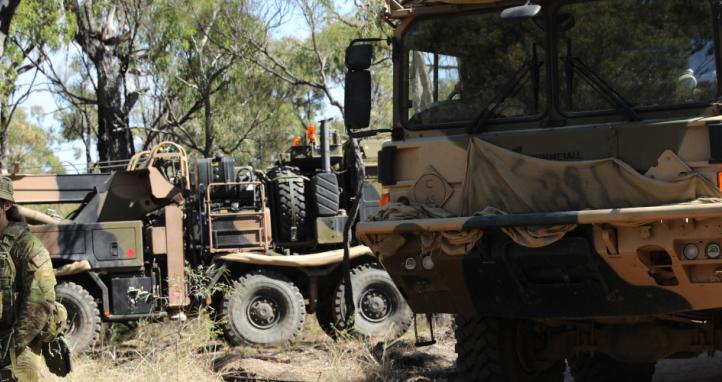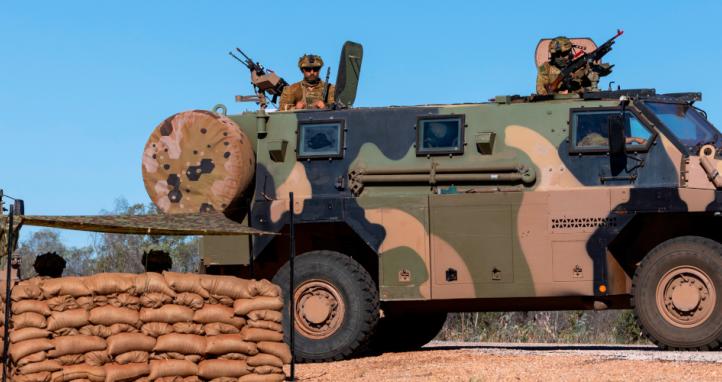When COVID-19 struck, along with the rest of the majority of Australia, 16 Regt, RAA was required to re-evaluate how it conducted business and how it could still do what it needed to do, but from home. Unlike most of Australia though, 16 Regt, RAA is a high-performance, combat focussed organisation that is required to maintain high levels of proficiency in skills that perish rapidly. With 95% of the Regiment working from home, and therefore unable to train on our technical equipment, the members of 16 Regt, RAA took the time to train on the moral component of fighting power and how to apply 'Good soldiering'. In a very timely piece of planning, just prior to the COVID-19 restrictions, the CO released his PME resource list which provided a list of relevant and relatable books, movies and games to study, with a view to provide tangible examples for the junior leaders of 16 Regt, RAA to apply when raising, training and sustaining their teams. Below, GNR Jack Randall provides his understanding and opinion of the movie Restrepo and the lessons that he has learned as a result of watching the film.
What have you learnt about the war that you think is enduring throughout all wars?
- Young men
- Unable to deal with emotional experiences they witnessed
- Mentality of soldiers from pre-intra-post
Enduring throughout all periods of wars is how young men are eager to volunteer and serve their country. Also common, is how even years after their deployment they are still unable to deal with and satisfactorily process the emotional experiences they witnessed and the toll these experiences continue to take on their lives despite various programs in place to assist them. This behaviour arises frequently after all conflicts. You often hear personal recounts of the emotional pain veterans still face. This is also justified by the several foundations in place, as well as the funding and support in order to try and manage these issues. While this theme is common amongst all conflicts, fortunately the intervention is uncommon in the way that it is evolving as there is an ever growing community of support and outlets to aid in the emotional tolls that the men and women may struggle with.
The mentality and mindset of the soldiers at 'Restrepo', was something that is common amongst all wars. Exemplified by the way the documentary began with the soldiers being very excited, spritely and enthusiastic given the opportunity, to utilise their training in a real life situation – at war – serve their country, and make their families, partners and friends proud. Almost immediately upon landing, and even in the helo flight over the mountainous environment, they were almost shell-shocked with the reality of the situation before them based on their recounts stating... 'We were not ready for this.' As they flew over the valley. This realisation of not being ready escalated gradually throughout their time there, almost directly in line to their excitement declining, especially as they lost soldiers and friends (i.e. Restrepo). Then when they finally were required to return home, it was inferred that they were relieved and thankful to be leaving. This scenario is demonstrated throughout all conflicts, as you see young men eager to serve, face the harsh reality of war, and then are very glad to leave it all behind.
What have you learnt about the war that is specific to the Afghan conflicts?
- Enemy unidentified
- Who is friend, who is foe
- What have we actually achieved, what have I actually achieved... Did it make a difference?
Specific to the conflict in Afghanistan is that the enemy was largely unidentifiable and fought in the shadows of the streets and mountains, as the soldiers tried hard to identify local farmer from hostile enemy fighter. This proved especially difficult as much of the local populace would frequently switch between the role of friend or foe upon their choosing, depending on conditions. This also made it particularly hard to liaise with locals, leading to high tensions. This led soldiers feeling frustrated and left them questioning what have we actually achieved, and pondering if they were actually making a difference.
As a soldier, we can relate to similar feelings of frustration, as we are regularly required to perform tasks and operate in a battlespace with little to no context, under quick direction, often not knowing entirely why and unable to see the final product of our actions, be it positive or negative. This makes it hard to understand why we are doing it at all. However, it is important to focus on not just the outcome, but also the process and the intent; and having faith that the experience is contributing to a better trained Army and ultimately making you a better soldier.
Will this change how you train and prepare for war as a result of watching this documentary?
Yes, although this question is particularly broad, how I prepare for war would be very specific to the conflict, my role, the conditions in the AO etc. Holistically, nothing can prepare you for war as much as war itself. This is likened to professional sporting teams who prepare with gruelling pre-seasons; still, nothing compares to the conditions of the first game/match/event, no matter how much you try to replicate it. Therefore, it's important that a key part of our preparation is acknowledging we'll never be absolutely prepared, no matter how many hours we may dedicate, miles trudged, or scenarios played out.
Additionally, to prepare as best I could, I would alter my training to include more stress and pressure to enable my ability to think on the run. For example, the standard Army BFA – a long standing staple of our physical training assessment – anyone can run a fast 2.4km, but it's a far different scenario if you've been told instructions to deliver, or a wounded mate you have to carry, all within a dangerous AO with potential enemy scanning their arcs for you.
Lastly, when you mention preparation for combat, you immediately think of long physical training sessions, and rehearsals of combat skills in likely scenarios. Whilst it can be inferred from the documentary, a pivotal part of preparation should be mental and emotional preparation, not just physical. So that the sudden exposure to such an environment wouldn’t be as overwhelming and foreign as it potentially could be, and enable soldiers to understand how to deal with this.
In conclusion, the young men of 2nd Platoon were exposed to an environment they were not adequately prepared to encounter. Inferences can be made to suggest that they were prepared for the idea of war rather than the reality. Despite their shortcomings in preparation however, they still showed resilience and perseverance despite the setbacks they encountered, to finish their deployment. These are traits which all soldiers can learn from, as the conditions will never be perfect and there are many factors you cannot control, however you can control your mindset and how you react.









